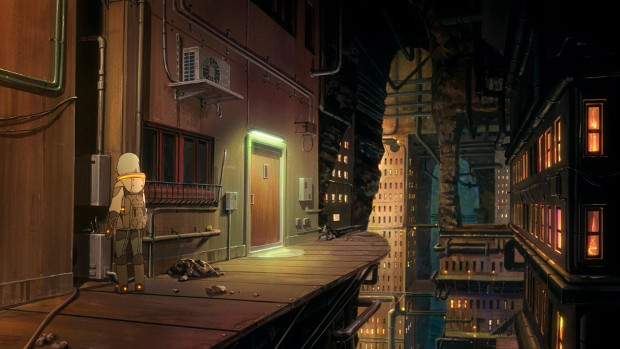
Patema Inverted is the latest feature film by the acclaimed director of Pale Cocoon and Time of Eve, Yasuhiro Yoshiura. The film tells the story of two young adults from different intersecting worlds. In each of their worlds, gravity pulls in different directions. Each world has been brought up to believe that their form of gravity is the "correct" one. When the two lead characters meet, they must help each other or risk persecution by their respective societies.
Patema
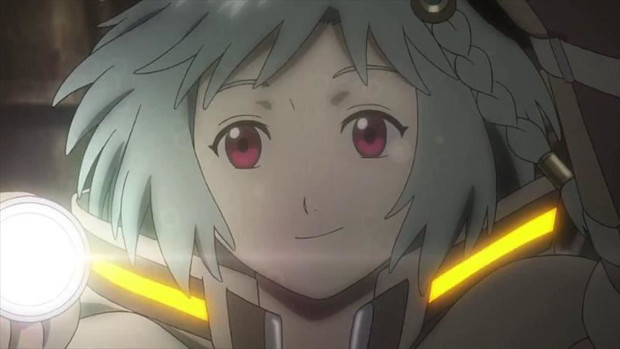
Patema comes from a world that is completely underground. It is an interweaving web of industrialization. In a world where nearly every building is producing black smoke, there are bound to be some environmental repercussions. The citizens are under constant threat of being exposed to hazardous fumes. Safety gear and protective masks are everyday attire. Some sections are even blocked off entirely to the general public for being too dangerous to enter.
Despite living in such a dangerous environment, Patema shows no fear or caution and is exploratory to a fault. She frequently enters the "danger zone" without telling anybody. Her risk-taker personality eventually puts her in harm's way. She has to fight off a mysterious man who hangs from the ceiling inside the danger zone. The altercation causes her to fall down a hole that resides in the danger zone's heart.
Her exploratory nature also carries over to her dreams. She has heard stories of the "other world" since she was a child and has always wanted to find and explore it, although forbidden by her society for what reason she does not know. She copes by drawing pictures of what she thinks the other world looks like.
Patema is a kind person, but she is skeptical of people when she first meets them. After she falls through the hole, she awakes in the alternate world of Aiga. Her dream has come true, but her perception of gravity is reversed. She immediately clings to a fence so she doesn't drift into the depths of the sky. The first person she encounters is Age, who she gets snippy with for not helping her immediately. Afterward, Age brings her inside a building so she can hang from the ceiling. Even though he has done nothing wrong, Patema starts to yell at Age and says she doesn't trust him.
However, once Patema warms up to somebody, she tends to be exceptionally attached to them. After Age explains to her that he does not intend to cause her any harm, she begins to trust him. Then, when Age has to leave to go to class, she cries for him not to leave her and to promise that he will return. These qualities of Patema culminate in a climactic scene halfway through the film where she risks her own life to push Age out of the line of a flying bullet.
Patema also has a tendency to be a bit of a "princess," as Age refers to her. She complains to Age that the building she is staying in is claustrophobic. Age then responds by asking her if she needs to be pampered and have everything perfect. She quickly answers, "yes!"
In Aiga, Patema is looked down on by everyone except Age. The citizens of Aiga have a prejudice against "inverts." Security soldiers employed by Aiga's government find out the she is residing with Age. They then come to take her captive and imprison her.
Age
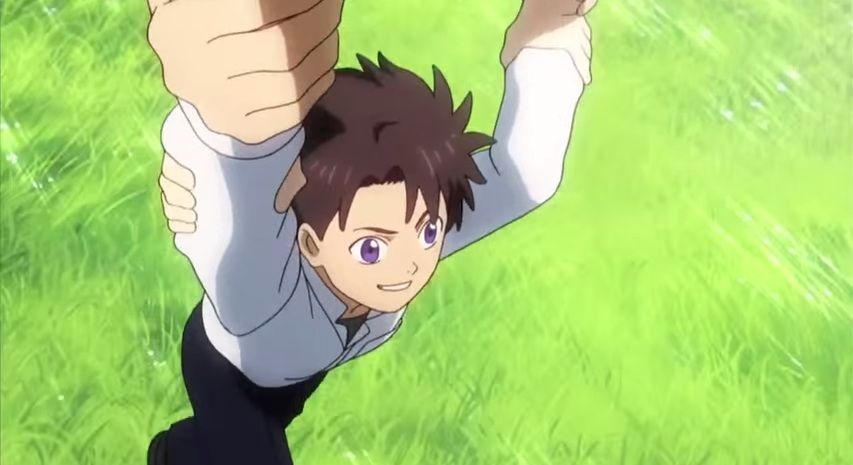
Age is the same age as Patema. He was born and raised in the world of Aiga, a rigid utopian future ruled by a totalitarian government. It is considered sinful for the people of Aiga to look toward the sky. Age and his classmates are forced to walk to school and sit in class with their heads down. They are even transported to school via a moving walkway to make things even more robotic. Age's school is under complete video surveillance at all times.
However, Age is the black sheep of his classmates. Much like the heroes in similar utopian science fiction works like Nineteen Eighty-Four or Terry Gilliam's Brazil, Age is the only one who is willing to resist indoctrination. He drifts off during class to look at the sky, and talks back to the teacher when confronted. Age is very punk rock. Give him a few years and I'm sure he'll be donning a studded jacket and a mohawk. Age's rebellious nature often does him more harm than good. As you can imagine, a strict society doesn't take well to rule breakers. His teacher constantly berates him for being disobedient. The ruler of Aiga, Izamura, even interjects on behalf of Age's behavior sometimes.
This aspect of Age's personality directly stems from his father. His father had a deep fascination with the sky and never agreed with the rule that it should be off limits. He spent a long time building a flying machine. Once the machine was ready, a crowd of people watched as he attempted to take off. This crowd included Age who skipped class to be there. The machine ran fine and Age's father was flying high. However, once in the air, Age's father fell out of the machine and lost his life. This was a traumatic experience for the young boy and one that motivated his actions later in life.
Age also believes in equality. He has a moral objection to Aiga's ideal that they are superior to inverts. He thinks inverts are just as deserving of life as Aiga's citizens are. Being outspoken on this issue also persuades some of his classmates to think the same. He doesn't believe in Aiga's predominant religion and therefore doesn't see the sky or inverts as sinful.
This belief crosses over into how Age interacts with Patema. When the two first meet, Patema is scared. Age professes that he isn't going to hurt her or turn her in just because she is an invert. Although he also acknowledges that he could be punished for not doing so. Because he doesn't discriminate against her, Age develops a sense of compassion and camaraderie with Patema. This is exemplified when he brings her bread after her first night in Aiga.
The Elder
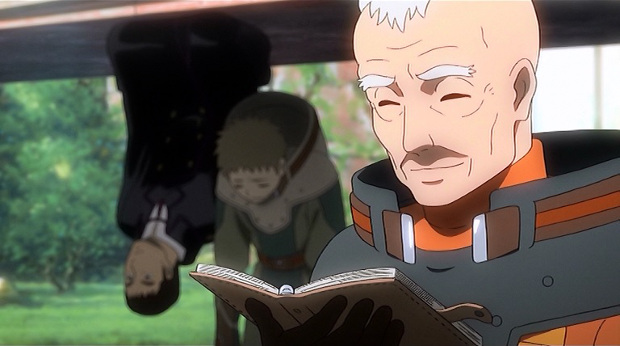
The Elder is Patema's father and the head political figure of their world. He is very protective of Patema. He always tries to keep Lagos away from her because he knows Lagos will talk to her about the outside world. When Patema goes missing, The Elder is worried and becomes an emotional wreck. However, he comes up with a plan to rescue her.
Much like Izamura in Aiga, The Elder is strict about the rules his citizens must follow. He gets upset with Patema when he finds out she has been going to the danger zone. When Porta returns to their world with Age, The Elder is furious. He says that Age (what they perceive to be an "invert") is not allowed in their world. He says that the rules are in place to prevent situations like this from happening.
However, it is clear that The Elder cares for the well-being of his people. He welcomes outside ideas and suggestions from his citizens. He doesn't put himself above them or see himself as being better than them. Once he calms his temper down, he even welcomes Age because he realizes how valuable he was to bringing Patema back.
Porta
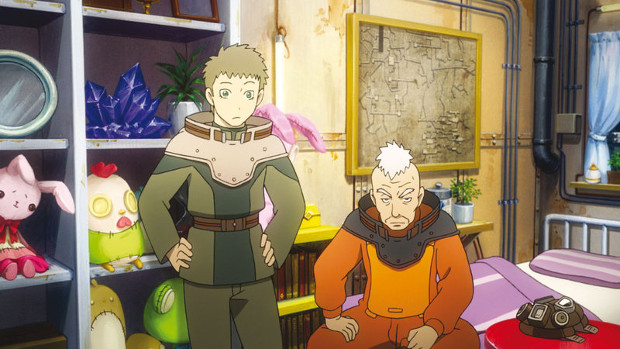
Porta is a childhood friend of Patema. He is also The Elder's right hand man. Since The Elder is growing older and physically weaker, he has Porta carry out a lot of his strenuous work. After Patema goes missing, he sends Porta after her.
Porta is also a very hyperactive person. This lends itself to his sense of humor. Porta is a jokester by definition. Even in the most inappropriate times and places, Porta always cracks a joke. Whether people laugh or not is irrelevant, he does it because it's a part of who he is.
He also has romantic feelings towards Patema. He feels jealous when he sees how close Patema has gotten to Age. He doesn't know that there is nothing romantic between them. Much to his credit however, his jealousy never causes him to show hatred towards Age. He is kind to him and is willing to help him. His feelings motivate him to protect Patema, even under the most dangerous circumstances. He even openly admits to having a crush on her at the end of the film.
Lagos
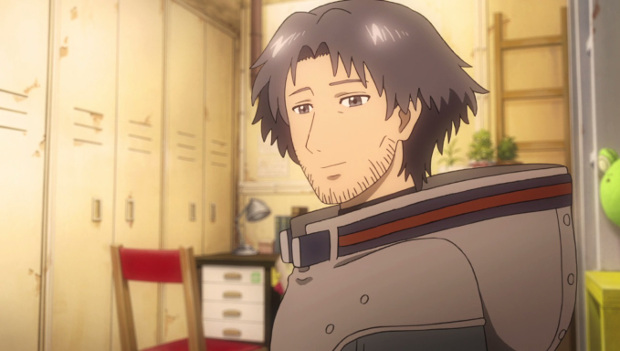
Lagos was a citizen of Patema's world. Aside from modeling his appearance after Spike Spiegel, Lagos spent most of his time acting like an older brother figure to Patema. Patema respected and looked up to Lagos more than The Elder. However, Lagos felt constrained by life underground and wanted to go explore the other world. This was prohibited by The Elder, but he did it several times anyway. Before every journey, Patema would beg Lagos not to leave. Upon his return, he would always bring Patema gifts. They were usually just little trinkets, but he also brought her a photograph of the other world at the beginning of the film.
Lagos's actions and descriptions of the other world had a profound impact on Patema. It directly inspired her exploratory nature. On Patema's first night in Aiga, Age is sitting outside looking at the stars. She joins him and comments on how beautiful the sky is. The reason she thinks this is because the image mirrors the photograph that Lagos gave her.
On his travels, Lagos met Age's father before his death. The two shared the same enthusiasm for projecting humanity into the sky and became immediate friends. They began to study the gravitational pull and conduct scientific experiments. Lagos then aided Age's father in building the flying machine. Lagos returned to the underground world after his friend's death.
Izamura
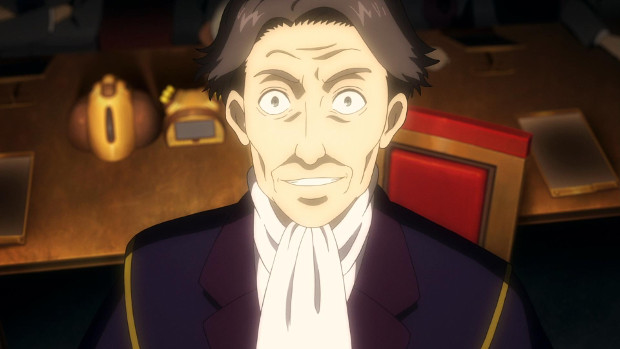
Izamura is the film's central antagonist and the totalitarian ruler of Aiga. He is a foil character to The Elder. Both are leaders who are strict about enforcing their rules. However, whereas The Elder shows concern for the happiness of his citizens, Izamura does not. To Izamura, the rules are the most important facet of their civilization and happiness is secondary. The Elder is strict because he cares for others, Izamura is strict because he cares for himself.
In Aiga's schools, there is a large television screen behind the teacher's podium. It turns on occasionally to show Izamura's face. He will then tell the students that law and order are the key principles of Aiga. He will also recount Aiga's history to tell them why looking into the sky is punishable.
Part of the reason Izamura puts so much emphasis on order is because of religion. The film never explores the religion of Aiga in depth. However, Izamura will refer to actions he disagrees with as being "sinful" and "against God's will." He will also use religion as a fear tactic to scare his people into obeying his demands.




